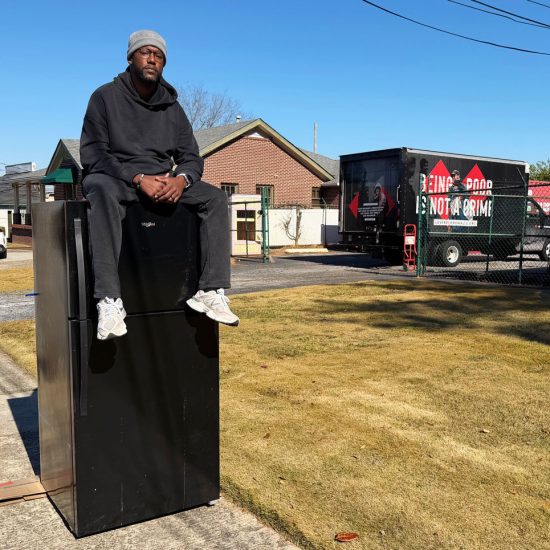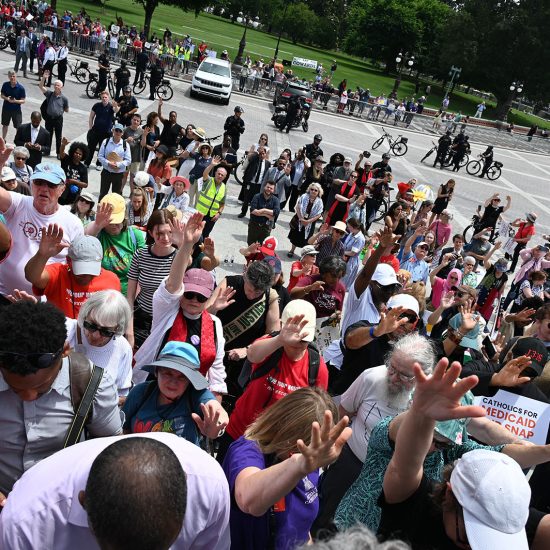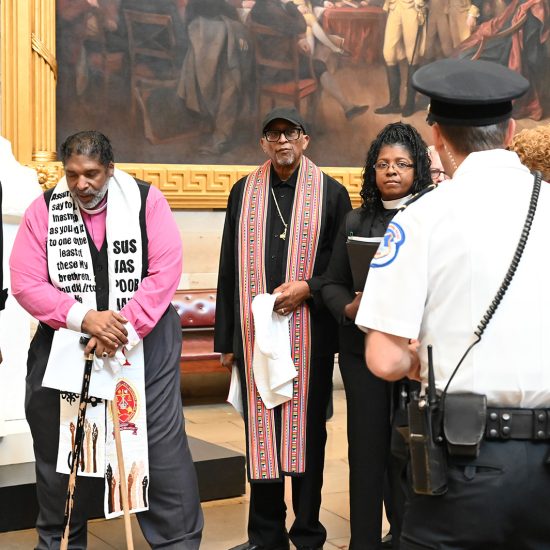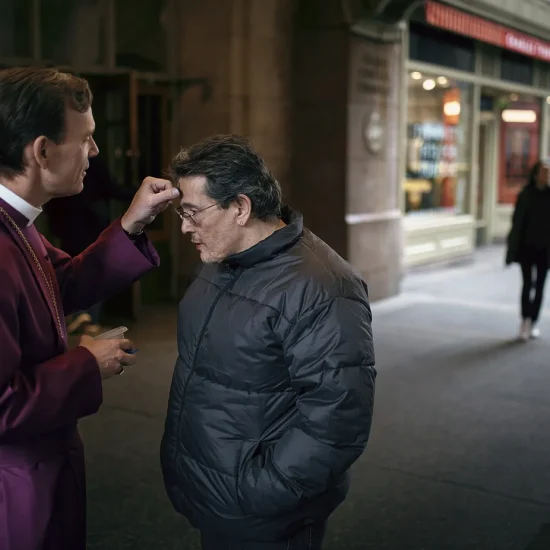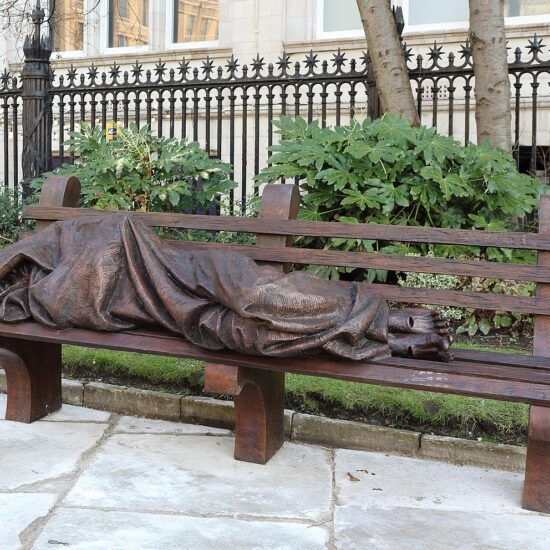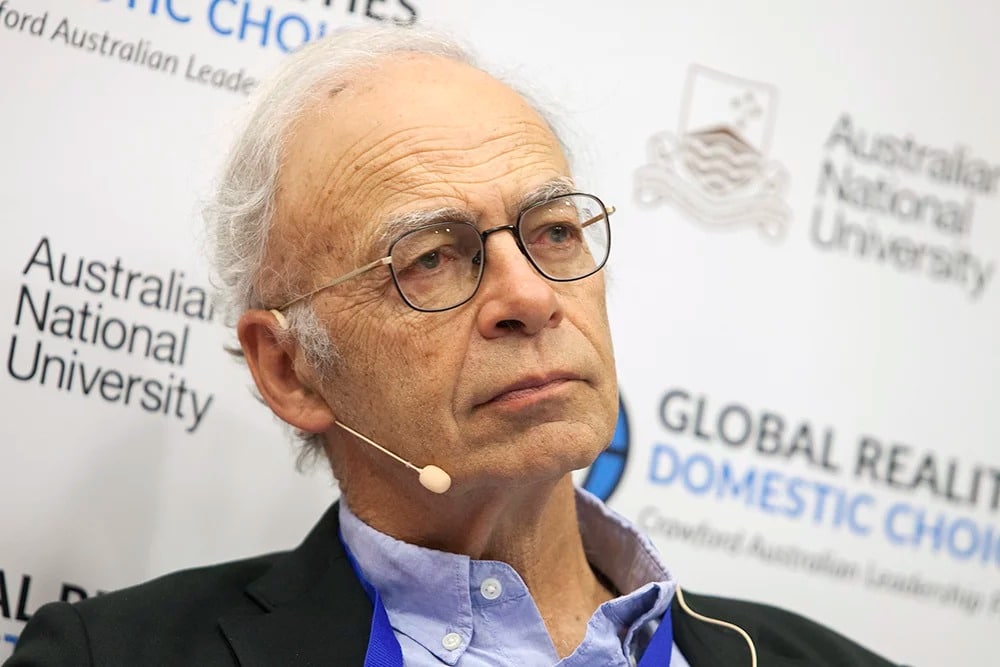

Peter Singer at the Crawford Forum in June 2017. Photo courtesy of Crawford Forum/Creative Commons
(RNS) — On the occasion of the republication of his popular book The Life You Can Save for its 10th anniversary, I recently interviewed Peter Singer on the topic that put him on the map: our moral duties and obligations in light of profound global poverty.
Singer, who is the rare academic who has genuinely affected the broader culture, has been particularly influential when it comes to arguing that aid organizations serving the most vulnerable deserve our support. Here he tells how he became interested in poverty issues and the influence of “The Life You Can Save” over the past decade. This interview has been edited for clarity and length.
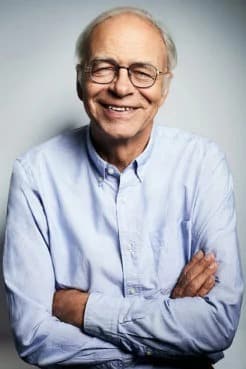
Peter Singer in 2017. Photo by Alletta Vaandering
Some readers know you only as a bioethicist. Can you tell us a bit about your personal history with global poverty?
I can’t remember a time when I was not aware of the fact that there are people in the world who are so poor that they don’t get enough to eat. In 1967, when I was 21, the eastern region of Nigeria declared itself independent as the Republic of Biafra. That led to a civil war and blockade that triggered a famine in which an estimated 2 million people died. The media showed vivid photos of starving children. I was troubled by those photos, but did I do anything significant about it? No.
In 1971, when I was a graduate student, studying philosophy in Oxford and already married, an autonomy movement in what is now Bangladesh was brutally crushed by the Pakistani army. Nine million people fled across the border into India, which appealed for assistance to feed and shelter this huge number of people, but not enough was given. It can’t be right, I thought, that people like me in affluent countries should have much more than they need while others have so little that they are in danger of dying.
I had come to Oxford on an Australian government scholarship, and my wife and I went to talk to (the humanitarian aid organization) Oxfam, which had its headquarters in Oxford, and after learning about what they were doing for the refugees in India as well as for people in poverty more generally, we decided to give 10% of our income to Oxfam. This also led me to write my first publication on global poverty, the article “Famine, Affluence and Morality.”
One of the places it has ended up was in your book The Life You Can Save. What were your goals in writing the book?
My initial goal was to reach a wide audience with an extended version of the argument I had made in “Famine, Affluence and Morality” — essentially, that if you are middle class or above in an affluent country, then to live an ethical life it is not enough to refrain from lying, stealing, injuring or killing, and so on. We also have to do something to assist people who, through no fault of their own, lack the necessities they need to survive. My ultimate goal was to bring about a new ethic of giving to people in extreme poverty.
What are your hopes for the new 10th anniversary edition?
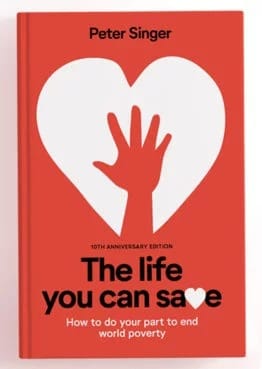
The 10th anniversary edition of Peter Singer’s book “The Life You Can Save.” Courtesy image
The first edition did lead to some progress. Many people read it and started giving more, or giving more effectively. The former journalist Cari Tuna read it, for example, and together with her husband, Facebook co-founder Dustin Moskovitz, set up a multibillion-dollar foundation called Good Ventures, dedicated to giving away almost all of their wealth in the most effective way possible.
The book gave rise to an organization, also called The Life You Can Save, which promotes the ideas I have described. It recommends nonprofit organizations that work to reduce extreme poverty, and have been independently reviewed and found to be highly effective.
The lack of information about which nonprofits are truly effective has long hindered giving. People hear of one or two organizations that have such high administrative and fundraising costs that little gets through to the people who need help. Then they say, “I don’t give because I don’t know how to donate in a way that will really help people in extreme poverty.” The Life You Can Save provides that knowledge.
Folks should read the book to get the full version in the argument, but for those unfamiliar with your work, what’s the takeaway? What do those of us who have more than we need owe the poor?
I would say we owe them equal consideration. That is, we should not think that the death of a child in Mali is less important than the death of a child in the United States or whatever other affluent country we may live in. We should not think that losing one’s sight matters less when it happens to someone in Eritrea than when it happens to our neighbor. And so on for all the many other preventable harms that happen to people.
Yet every time we spend money on luxuries that we do not need, when we could have donated that money to an effective nonprofit organization preventing the deaths of children by providing bed nets against malaria, or restoring sight by removing cataracts, we are failing to give equal consideration to people in low-income countries.
Admittedly, this is a very demanding standard — some will say too demanding. As an alternative, I could suggest the “rule of easy rescue,” which I often illustrate with the story of the drowning child in the shallow pond. If you can rescue the child, at no risk to yourself, you ought to do so. You ought to do it even if there is some cost to yourself — for example, you will have to replace your expensive shoes, which you are wearing and which you will ruin when you jump into the pond.
Most people agree with this judgment — it would be wrong to let the child drown because you don’t want to ruin your shoes. That judgment reflects our acceptance of the rule that if we can easily prevent something very bad happening, without sacrificing anything of comparable moral significance, we should do so. That rule is much more lenient than the principle of equal consideration of interests, but most people in affluent countries are falling far short even of that standard.
I’ve tried to argue in my own work that your concern for the poor — and especially our personal moral responsibility for the poor — has broad overlap with traditional Christian moral theology and Catholic social teaching. Do you agree?
I do agree with it. The gospel accounts of Jesus portray him as giving more emphasis to helping the poor than to any other ethical concern, so this should be a top priority for all Christians.
In addition, for Catholics especially, the church has taught, at least as far back as Ambrose, and continuing through Thomas Aquinas to several recent papal pronouncements, that what the rich have in “superabundance” is owed, by natural right, to the poor for their subsistence. That is very similar in its implications to the position that I hold.
Other religions also encourage those who have money to share some of it with the poor. This issue reaches across the divide between secular and religious people, and between adherents of different religions as well. It should be a unifying cause in a polarized world.
(Note: The Life You Can Save is available as a free downloadable e-book or audiobook at www.thelifeyoucansave.com.)


